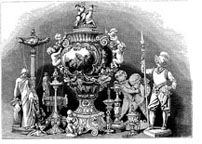
“Not as the World Giveth”
THE LOST CIVILIZATION OF AMERICAN CATHOLICISM
“The history of the past ends in the present; and the present is our scene of trial; and to behave ourselves towards its various phenomena duly and religiously, we must understand them; and to understand them, we must have recourse to those past events which led to them. Thus the present is a text, and the past its interpretation.” — John Henry Newman
Ed. Note: The library about which you will read closed its doors to the public in 2020. The loss of a place has made a time ever more distant.
In the top story of a vast building, mostly deserted, at spare times and odd hours during the past year, I have been searching for the remnants and traces, the documentations of a lost civilization. I have been ransacking as diligently as any determined thief. If Our Lord likened Himself to “a thief in the night,” should I abhor the comparison? But as in His case, so in mine, the analogy has limits. My presence occurs with the consent of responsible authorities, and I am more than willing to display my hoard. Moreover, the common thief would not recognize as treasures what I have found, more precious than the most precious stones, though they be in plain sight and readily available to the eager confiscator. The Kingdom of Heaven is like this.
On the fourth floor of the Seminary of the Immaculate Conception in Huntington, New York, is a library containing extensive holdings in philosophy, theology, and all things related to the Catholic Church. I have been perusing enormous tomes that contain the original editions of the Brooklyn diocesan newspaper The Tablet from 1946 to 1952. The originals, unindexed, are bound by the year in weighty black bindings. The pages are fragile, tearing with the slightest excess pressure, so each must laboriously be turned as a unit. Inadequate is the term yellowed. They have been dyed by time with the half tints and combinations found not on the flamboyant but rather those colors — apricot, peach, ecru, saffron — on the subdued leaves of autumn.
So much is contained in these autumnal pages of the lives and writings of devout persons of Brooklyn, of priests, nuns, and brothers; of laymen of every stripe; of parishes, schools, hospitals, orphanages, and charitable organizations; of lectures, sermons, pastoral letters, commentaries, opinions, and debates; and, significantly, extensive reporting on the works of missionaries from Brooklyn who traveled to every part of the earth. Added to this, much about the Church beyond Brooklyn.
It is simply overwhelming and exceedingly humbling to realize that each person encountered through this medium, every indication, every vestige should be treasured, while simultaneously acknowledging the inability to do so. Yet, by a faithful intuition we may glimpse, however fleetingly, the truth that this must be so and must be accomplished by Someone eternal, inexhaustible, merciful, and just. I have thought at times that I am not simply scouring newspapers — written treasure houses — so much as I am rummaging through the mind of God.
How did I find myself engaged in such a search?
You May Also Enjoy
People jealously want to control the one thing that demonstrates God's infinite artistry and creativity -- life.
The mathematical probability of one person in the first century fulfilling just eight of the most straightforward Messianic prophecies is one in 100,000,000,000,000,000.
Remarks to the American Academy of Religion, Anaheim, California, November 20, 1989.
There is a…

